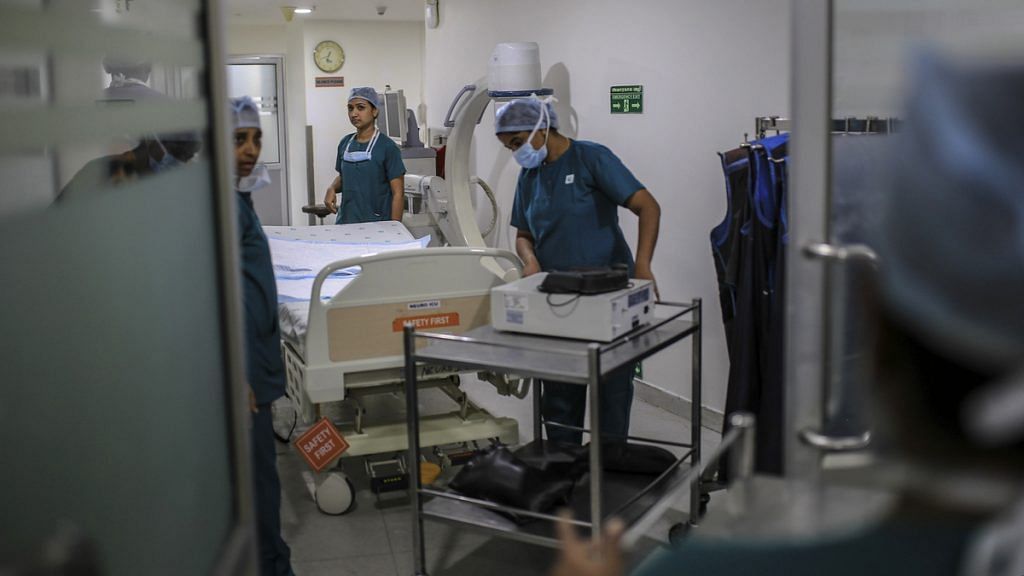New Delhi: In the last 12 months, Lokenath Majumdar was unable to attend work on a couple of occasions at a local jewellery store in west Delhi because he was unwell. Majumdar was eligible for compensation under the country’s social security programme — he is a subscriber to the Employees’ State Insurance (ESI) scheme — but was denied benefits twice.
When he claimed compensation, he was told that his name is “not registered” with the Employees’ State Insurance Corporation (ESIC) — the nodal body for the self-financing health insurance scheme under the aegis of the union labour ministry. Employees and employers — of any organisation with at least 10 workers — both make a fixed contribution towards the ESI scheme.
“They (ESIC officials) said that they have not received any money. If the money had not been deposited, how was I given the (ESI subscriber) card?” Majumdar wondered.
He isn’t alone. R. Mandal, a migrant labourer in Gurugram, has also faced issues in receiving compensation from the ESIC.
Under the Employees State Insurance Act, 1948, subscribers are entitled to full medical care, besides compensation of wages in case of absence from work due to sickness or injury or maternity leave.
But Mandal said it’s “impossible to get money in case of leave”.
“I have not gone to my village for over two years over the fear of losing money,” said Mandal.
In the last couple of years, the ESIC has been battling several wars on different fronts — jump in subscriber base, poor infrastructure and bureaucratic processes.
Speaking to ThePrint, ESIC director general Raj Kumar said they were facing “some problems”.
Of the ESI’s around 3 crore subscribers — mostly low-wage earners who are covered under the scheme along with their families — many have had to deal with complicated paperwork and the ESIC’s lax administration.
Also read: Not a single rural healthcare centre in 15 states meets govt’s minimum quality standards
Overburdened, but under-utilised corpus
Until 2016, the ESIC had about 2 crore subscribers. But in the 2016-17 fiscal, through a series of amendments, the labour ministry extended the scope of ESIC to cover those earning up to Rs 21,000 from Rs 15,000 earlier, leading to the immediate addition of one crore people to its subscriber base.
“The scheme has been expanded, and in one go over one crore people were added to the ESI scheme. Now to cope with this, we need to create the necessary infrastructure,” said Kumar. “We are in the process of doing so but it takes some time.”
The ESIC is also sitting on cash reserves of over Rs 78,000 crore — double of what it had about five years ago — but a large portion of this corpus remains unused and the benefits do not reach the subscribers on time.
In 2017-18, the ESIC spent Rs 10,380 crore on medical, cash and other benefits against the budget estimate of Rs 13,290 crore — despite an increase in subscriber base.
However, Kumar said about Rs 30,000 crore of the reserves is meant to handle liabilities and not for subscribers’ benefit. He declined to provide figures of claims registered and settled.
In December 2014, a Comptroller of Auditor General report tabled in Parliament had lashed out at the ESIC for inefficiency in its operations leading to delays in releasing cash benefits to ESI subscribers.
‘Unreasonable process’
The main problem for workers arises in case of cash compensation, said Masab Shamsi, member of Gurugram-based trust, Safe In India (SII), that acts as a facilitator for hundreds of migrant workers in getting their dues from ESIC in cases of medical emergencies — including disability and maternity benefits and loss of jobs.
“In several cases, the workers have to be given cash compensations when they suffer from partial or total disability, loss of employment or even in case of leaves. The process is unreasonably lengthy and unwieldy, forcing many to opt out,” said Shamsi.
The SII website says, “Their (workers’) health-care and compensation from Employees State Insurance Corporation (ESIC), where eligible, is often excessively bureaucratic and late. Many of them return to their villages having lost their fight with the inefficient and unsupportive system.”
At least five subscribers ThePrint spoke to said medical facilities available at ESI-affiliated hospitals and dispensaries in small and remote towns were worse compared to the services provided in bigger cities.
“Often there are no equipment and very few doctors and medical staff to take care of patients in the small towns, where we come from,” said Prabhu Sharma, another migrant worker in the national capital.
A senior ESIC official told ThePrint that subscribers often travel long distances to avail of benefits from ESI hospitals.
“This can be cumbersome, leading to many pulling out (not availing the scheme),” said the ESIC official who didn’t wish to be named.
At present, over 150 hospitals and 1,400 dispensaries across the country offer medical assistance to ESI subscribers.
Also read: In implementing health insurance scheme, Centre may face political roadblock from states
Lack of transparency on part of employers
Shamsi added that the confusion often arises due to irregular or non-payment of dues from the employers.
Employers contribute 4.75 per cent of the total monthly salaries that go towards their employees’ ESIC funds. Individual employees contribute 1.75 per cent of their monthly salaries.
“However in many cases, we have seen that the employer has not made its contribution. This is one of the most common problems that we come across,” Shamsi said.
ESIC chief Kumar said: “We are taking immediate steps to ensure that the bottlenecks are removed and the beneficiaries are not inconvenienced.”
He said the body has tied up with 1,500 private hospitals to cater to the larger number of subscribers. Besides, ESIC is building 30 new hospitals, and recruitment of doctors, nurses and paramedical staff is already on, said Kumar.
